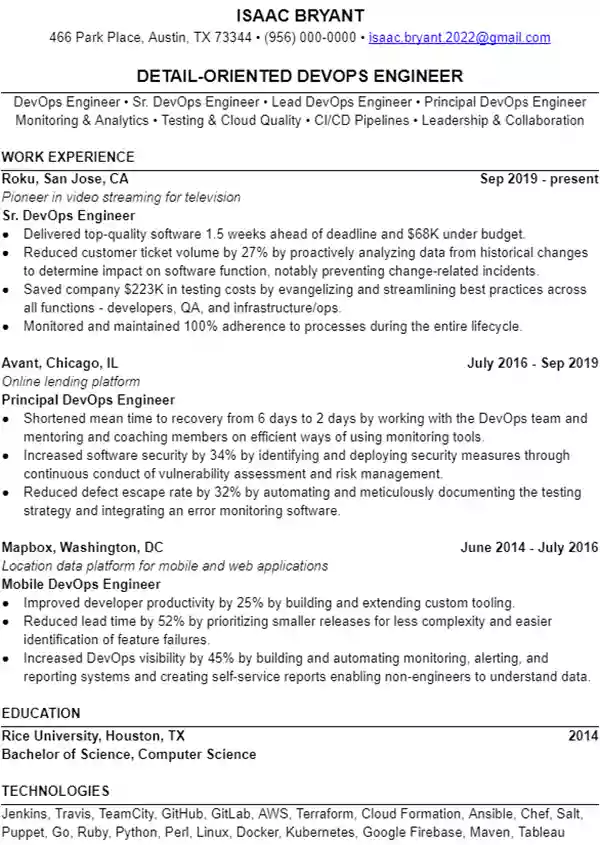DevOps Engineering Resume Example
View our professional DevOps engineering resume template and learn from the pros how to construct your own


How to write the perfect DevOps engineering resume
You know how DevOps stresses continual improvement and iteration? Whether you have a rough draft of a resume that you’re looking to improve upon or you’re starting from the ground up, get ready to apply that same mindset to writing an awesome DevOps engineering resume.
DevOps engineers do it all. From writing code throughout the software development life cycle, to handling deployment, all the way to maintenance and updates, DevOps engineers are the lifeblood of the modern IT department. You’ve put in a lot of work to acquire the skills you use at your job, and you deserve a salary that reflects that value.
In order to get there, though, you’re going to need a perfect resume. But writing that resume isn’t exactly writing a shell script either.
Start by checking out our DevOps engineer resume examples, and look over the resume template in order to create a resume that will grab attention and win you more job interviews.
Leet Resumes provides you with an optimized DevOps engineering resume template so that you can get started today.
Are you ready to get that dream job?
It may seem daunting, but you’re about to learn how you can create an ideal resume that will set you apart from all the other applications.
How to write a DevOps engineering resume that earns more job interviews.
Pretty much everyone needs DevOps engineers. Of course there’s always jobs at tech companies, but, with the proliferation of cloud computing and even the most traditional companies releasing digital products, your options are virtually limitless. You could work in healthcare, banking, pharmaceuticals, or most any other industry of your choice.
And while you may find the best salaries and most support at large multinational corporations, even the smallest, mission-driven startups have job openings for DevOps engineers. Take some time to think about your career goals and what would make you happy.
Just keep in mind that your services are absolutely crucial to any modern business. You’ve earned the respect of your bosses and colleagues, the chance to contribute to meaningful projects, and, it should go without saying, a very comfortable wage.
That job won’t come to you like Deus Ex Machina, however. You have to pursue it.
You already know the first step on this journey. It’s writing the perfect DevOps engineering resume.
The stakes could not be higher. If you want to maximize your chances of getting the job, it might be a good idea to hire an expert resume writer to do it for you.
And, despite what you may be thinking, it’s not even expensive.
When you choose to work with Leet Resumes, our experts will craft a top-notch resume for you at no charge. All we ask is for you to consider tipping after you receive the resume and see the quality for yourself.
The way to format a DevOps engineer resume
If you do want to write your own resume, we can still help. We’ve provided you with this fool-proof resume template. Just follow this easy formatting:
- Name + Contact
- Professional Headline
- Professional Summary
- Work Experience
- Education
- Keywords
That’s really all there is to it. If you follow this resume template to the tee, then you’re guaranteed to land good interviews.
Now, since you’re a DevOps engineer, we think it’s safe to say that you are good at following a method, step by step. For instance, before installing new software, don’t you always make sure that your packages are up-to-date and that your environment meets all the dependencies?
Follow this same principle when creating your resume. Follow the method and stay consistent.
The main reason this is so important is so that you don’t confuse any application tracking systems (ATS). Most modern companies use this software to screen applicants before the resume heads to an actual person.
The ATS is programmed to parse a file in a particular way. They’re not exactly the most artificially intelligent algorithms on the disk either, and, when they encounter unusual formatting, like images, multiple columns, or text boxes, they quickly break down.
Make it easy on the ATS. Keep your formatting straight, or your resume might hit the bin because it thought you weren’t qualified when it put your phone number as your work experience.
You know how finicky computers can be when we don’t “talk” to them in just the right way. Don’t risk losing a job over an easily avoidable error message.
Name + Contact
#!/bin/bash
Typing the shebang at the top of your scripts is probably second nature for you at this point. You just do it, otherwise the script won’t execute.
Apply that same logic to your resume template now.
Stick your name at the top of it. Underneath your name, write a good telephone number and a professional sounding email address.
Professional Headline
Now we’re going to do some visualization. Close your eyes and imagine your future boss. Picture their stresses, their mandates, and the pressure they’re under from different stakeholders. They’re in dire need of a new DevOps engineer for their team.
Taking a moment to look through some resumes, they glace down at yours. Below your name, it says:
“Elite DevOps Engineer”
They’re going to keep reading!
That’s the purpose of the Professional Headline. In just 3-5 words, you need to set yourself apart from all the other people who are also applying for the job.
Professional Summary
When you start working with a new programming language or framework, what do you do? Chances are, you start with the quick reference to get a high-level overview of what’s going on and how you can start using it.
The Professional Summary is the quick reference for your job history.
Include 2-4 lines in this section on your desired job, your career history, and any awards or achievements that you’ve earned in your work. This is the format:
- Job title you’re seeking
- DevOps engineering skills that you possess
- DevOps engineering accomplishments and achievements (optional
- Awards and promotions (optional)
While not all applicants will have lines 3-4 if they’re early on in their careers or haven’t made a name for themselves, you should definitely have lines 1 and 2. This will tell the recruiter who you are and what you want.
Hopefully, as you grow in your profession, you can continue to add to this section. But if you don’t have any awards or accomplishments, it’s not a big deal. By spending less space on the Professional Summary, you have more room in the resume template to talk about the other selling points that make you unique.
So, how are you feeling? Are you starting to wish that someone could take this job off your hands?
Well, that’s what Leet Resumes is here for. We’re here for you! Let us write an optimized DevOps engineer resume for you, and you don’t have to pay a cent if you don’t want to. We work solely for tips because we know that you’ll love what you see!
Work Experience
While the Professional Summary was akin to the quick reference, the Work Experience section is the full documentation. Within this section of the resume template, talk about the jobs that you’ve had and highlight the most important experiences that you had in those positions.
This should be fairly straight-forward, so long as you keep this one rule in mind. Don’t just list off your daily responsibilities. For example, don’t just write “administration of IT infrastructure”.
Go one step further.
The point of this section isn’t to just list back the job requirements. Daily responsibilities are almost always included in a job posting, and, if you couldn’t do them, why would you be applying in the first place?
Your goal is to set yourself out from all the other engineers who can also handle those tasks. Think about what makes you unique.
In this case, you have full permission to brag about yourself.
So, what do you put instead? Go through these five key points.
Outline accomplishments, success, and achievements
This is the main thing that will make you stand out. You only have a limited space to convey this message, so make every word worth it. Start with talking about your professional successes so that the hiring manager gets a clear and tangible picture of what you bring to the table.
Your goal is to excite them at the prospect of hiring you.
Use strong verbs
Consider the following:
I often used to manage the automation of repetitive tasks
Automated repetitive tasks
What takes the first sentence 10 words to convey only takes the second sentence three words. That’s a big difference in how the recruiter will perceive both your competence and your attitude as a go-getter.
You see, when you use strong verbs, it’s hard not to notice the difference. You present yourself as an active employee, and that’s exactly what they’re after here.
Include numbers
You may not be a physicist or a mathematician, but that doesn’t mean you don’t have a love—or a least a healthy respect—for numbers.
Numbers are the basis of computation. They convey truth quite plainly.
Show your potential employer the truth about your value by including as many numbers in your resume as you possibly can.
So, for example, rather than writing that you use Terraform to deploy Infrastructure as Code,write that you use Terraform to deploy Infrastructure as Code to support 5 mission-critical applications across 3 geographical regions.
Look for places where you can put a number. If it fits, include it.
Talk about promotions
If you’ve ever gotten a promotion, this is exactly where you want to mention it.
Promotions are a well-recognized signal of excellence. Nobody gets promoted for poor performance. If a previous boss recognized your worth by promoting you, the hiring manager will see that same thing.
Plus, any promotion also shows that you’re willing to grow into new roles and take on new responsibilities. That’s another thing that recruiters are always looking for in a new hire.
Use specific dates
Do you have a gap or two in your resume that you’d rather not talk about it? You’re not the only one, so trust us when we say that it’s not a deal breaker.
You know what is a deal breaker though? Looking like you’re trying to hide something. Nobody is going to give you an interview if they can’t trust you. So just be honest and put dates on your resume.
Education
Whether you graduated from university with a comp-sci degree, made it to the top through self-study, or enrolled in a coding bootcamp, now is the time to talk about how you learned to get where you are now.
Besides including institutions attended, degrees earned, and GPAs, don’t forget to include any certifications that you’ve earned. So if you have a CompTIA cert, a Linux Foundation certification, a cloud-based cert from AWS/Azure/Google Cloud, or any of the other many IT certifications out there, this is the place to list them.
Finally, be sure not to talk about any degrees that you didn’t fully earn unless you’re currently studying in the program.
Keywords
We’re nearing the conclusion of the resume template, and it’s time to go out with a bang. The keywords section will round out the resume and show why you’re the best person for the job.
Basically, it shows the recruiter that they’re not going to get better than you. Don’t forget to include both soft and hard skills, as well as any awards that you’ve earned for DevOps engineer.
Here are some recommends to start out:
- Monitoring
- Automation
- Collaboration
- Code review
- Infrastructure management
You also want to list the different technologies that you use. If you specialize in a certain cloud environment like AWS, put that. If your specialty is Linux admin, put that. It’s even worth putting experience with tools like MS Office or different Kanban boards.
After reading the keywords section, the hiring manager will see this amazing opportunity for what it is.
Succeed in your job hunt by hiring a professional resume writer
At the end of the day, there’s really only one way to know for certain that your resume is the best it can possibly be. And that’s hiring an expert who works on them every single day and delivers real results.
Leet Resumes will provide you a 100% personalized DevOps engineering resume at absolutely no charge. We always appreciate the tips that we receive from our happy customers.
Time to get hunting!










